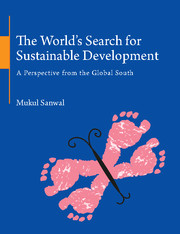Book contents
- Frontmatter
- Dedication
- Contents
- Preface
- Acknowledgments
- Abbreviations
- INTRODUCTION
- 1 Social Dimension of Sustainability
- CONSUMPTION IN AN UNEQUAL WORLD: FRAMING INTERNATIONAL COOPERATION
- CLIMATE POLICY: GLOBAL TO NATIONAL
- SUSTAINABLE DEVELOPMENT: NATIONAL TO GLOBAL
- CONSUMPTION IN A MORE EQUAL WORLD: SHAPING SOCIETAL FUNCTIONS
- 17 Geoeconomics of Human Well-being
- 18 Social Science – Policy – Society Interface
- 19 Reframing the ‘Common Concern’ From a Physical to a Social Problem
- 20 Developing a Shared Global Vision
- GEOPOLITICS TO GEOECONOMICS: RURAL–URBAN DIVIDE, RATHER THAN BETWEEN COUNTRIES
- THE ASIAN CENTURY
- Index
18 - Social Science – Policy – Society Interface
from CONSUMPTION IN A MORE EQUAL WORLD: SHAPING SOCIETAL FUNCTIONS
Published online by Cambridge University Press: 18 December 2015
- Frontmatter
- Dedication
- Contents
- Preface
- Acknowledgments
- Abbreviations
- INTRODUCTION
- 1 Social Dimension of Sustainability
- CONSUMPTION IN AN UNEQUAL WORLD: FRAMING INTERNATIONAL COOPERATION
- CLIMATE POLICY: GLOBAL TO NATIONAL
- SUSTAINABLE DEVELOPMENT: NATIONAL TO GLOBAL
- CONSUMPTION IN A MORE EQUAL WORLD: SHAPING SOCIETAL FUNCTIONS
- 17 Geoeconomics of Human Well-being
- 18 Social Science – Policy – Society Interface
- 19 Reframing the ‘Common Concern’ From a Physical to a Social Problem
- 20 Developing a Shared Global Vision
- GEOPOLITICS TO GEOECONOMICS: RURAL–URBAN DIVIDE, RATHER THAN BETWEEN COUNTRIES
- THE ASIAN CENTURY
- Index
Summary
Interrelated systems and the environmental perspective
Since the Stockholm Conference on Human Development, held in 1972, sustainable development has been seen as a practical tool for achieving incremental improvements in environmental protection. It also had a visionary impact with its stress on human needs and social justice, dependence of human well-being on the environment, characterization of limits, strong economy and support for future generations. The conventional viewpoint is now facing the challenge of a growing global economy meeting ecological limits in the sink constraints of the atmosphere. It is being stressed that there is a need for a transformation of the economic system itself, for which the industrialized countries must take a primary responsibility because in recent years the affluence factor has exceeded the population factor in driving natural resource use.
The structure of economies forces them to grow, and sustainable development demands a new economics, informed by a broader vision of human nature and human well-being. A world in which 9 billion people all achieve the level of affluence and the consumption patterns in developed countries would need an economy 40 times bigger than today's (200 times bigger than in 1950) by the end of the century [Jackson, 2009, p. 14]. Consequently, the existence of ecological limits poses the moral question – if this cannot be achieved through technological efficiency, how much of the world's resources does any one nation or individual have a right for their well-being?
Twenty years after the Rio Summit on Environment and Development, held in 1992, the world is still facing two challenges: meeting the demands for better lives by tripling the size of the global middle class by 2050 and keeping this growth within planetary limits. The global policy response to these interlinked challenges does not require slowing growth, by modifying longer term trends to enable the right kind of growth policies have had a clearer impact in improving resource efficiency than in reducing environmental impacts or enhancing ecosystem resilience. The global policy response for dealing with the ‘sink’ constraints of the planet requires a strategic shift from merely considering environmental damage and resource productivity to enhancing and equitably sharing ecosystem services.
- Type
- Chapter
- Information
- The World's Search for Sustainable DevelopmentA Perspective from the Global South, pp. 223 - 228Publisher: Cambridge University PressPrint publication year: 2015

